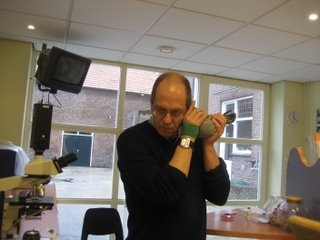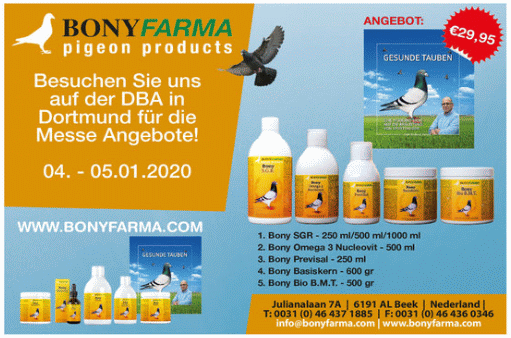In January – by Dr. Peter Boskamp…

useful tips
Since we've talked so much about the different viruses lately, we almost forget about them “simple diseases” with our pigeons.
However, we must continue to address these diseases to prevent them from causing problems unnoticed.
Take trichomonas. Occasionally there are stubborn strains that seem difficult to combat. We are all to blame for this, because for many years the drug has been used very carelessly to combat this infection.
Even now, very short cures of
given over the drinking water for one to two days. This ensures that only
the weak brothers are removed and the stronger more and more in the
come to the fore.
as soon as that “R” in the month it shows up
better not to go on a drinking water regimen altogether if you don't have that regimen
apply correctly. Since the pigeons can drink far too little in the blood in the
Usually only suboptimal doses are achieved and especially with short applications
only the strongest parasites survive with all the consequences that pertain
result from this in the longer term. It is therefore important that the pigeons are enough
Drink water if they are to be treated well. This can be achieved
by keeping the pigeons away from the for a few hours after feeding the feed
water supply to be released. If you use the waterer two hours after feeding
of the pigeons back on the loft, the pigeons usually drink
enough to get a sufficiently high blood level of drugs in the blood
to reach. Nevertheless, I am not for drinking water cures in the fall. I prefer
two capsules. This must then be given on two consecutive days.
If this is too much work, a good healing can also be done with the gift over that
feed can be achieved. Given the resistance of the parasites to
Because of the different medicines, it is important to keep the treatment long enough.
A full week is often necessary.
A natural way to reduce infection pressure from trichomonas and coccidia is to use products containing Usnea barbata. The above parasites hate this herb. Again, the pigeons must drink enough to make this healing effective.
We believe that by using these natural resources twice a week during the season, the pigeons can be kept virtually trichomonas free. The advantage is that there is no resistance to such funds.
Many breeders still believe that there is a whole range of anti-trichomoniasis remedies. Nothing is less true. The agents that are used to combat trichomonads all belong to the so-called imidazole compounds. These remedies can be considered related. With resistance to one of these agents, the parasites usually become resistant to other agents used to combat trichomoniasis very quickly. For this reason, it cannot be said with enough emphasis that we should not give trichomonas remedies casually.
Coccidiosis is an intestinal parasite that can be combated very well with Baycox, for example. 3-4 ml per liter of drinking water during a day or 4 ml for more severe infections are still sufficient.
It is highly advisable not to use this drug during flights. The form can be greatly affected by the use of this drug. So plan the last application at least three weeks before the flights.
Baycox is a drug that the
coccidia kills. Amprolium, on the other hand, is a so-called
coccidiostat. That is, it inhibits coccidia in their
However, development once administered does not kill the parasites
effectively off.
Indeed, sulfametoxazole is
only sulfate preparation that can still be used successfully against coccidia.
Other sulfa preparations such as sulfadimidine sodium and sulfadiazine
should simply be forgotten for effective treatment of coccidiosis.
As already mentioned, the
Use of Usneano preparations helpful in combating a coccidiosis problem
be. The advantage of such active ingredients is that they
Shape of the pigeons do not affect negatively, but the condition of the pigeons in the
Improve relationship to various drugs.
Worms are also an underestimated
Dilemma. Where previously flown with few worms still a reasonable price
could be, this is no longer the case today. Pigeon sport is top sport
become and that means that small deviations already have big consequences
can have.
A good check on worm problems is or
falls with a good diagnosis. Beware of vets who poop
directly on a glass without having to use a centrifuge to look at
to prepare thoroughly for the examination. These vets totally lie
incorrect. Some time ago I had a breeder who had 16 breeding pigeons
died after losing a lot of weight. He came to our clinic for
a second opinion. The pigeons were full of hairworms. That was loud
investigations into the cause of death. The breeder could not understand it.
After all, the vet had already checked the feces. (but without
thorough preparation for the research). By going directly to the feces below
looked under the microscope, he missed the correct diagnosis. He had Baytril
given because he “with his clinical perspective” sure it was
had to be paratyphoid. Not so nice. The breeder was stupid.
I would like to point out here that one
correct diagnosis with a
properly conducted investigation stands or falls.
The best way to combat
Worm infections is individual treatment. This
takes time, but increases the chances of getting the infection right
is treated. Don't forget the medication after
fortnight to repeat to kill the larval stages leading to
were still insensitive to the drug at the time of the first treatment,
because they were protected by some kind of armor. Forget
Neither do you, the dovecote after treatment as with coccidiosis
burn out well. Disinfection is fun, but worms
and coccidia are not sensitive to disinfectants. Burn out only helps here.
The endo-ecto drops also work
against worms. However, do not use this during the
flight season. The form suffers from this application.
So if you use these drops, then before starting the
Season.
Finally, a note: after taking medication, there is no harm in giving the pigeons extra vitamins and a probiotic for a few days.
Good luck

Peter Boskamp
find them on a complete overview of Bony Farma Productswww.bonyfarma.com.
Advertising:




